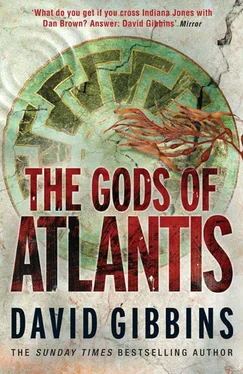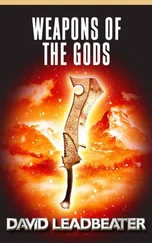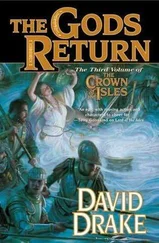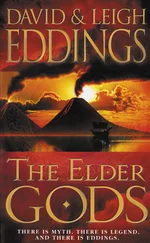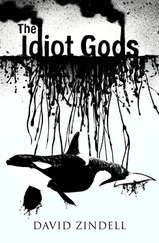David Gibbins - The Gods of Atlantis
Здесь есть возможность читать онлайн «David Gibbins - The Gods of Atlantis» весь текст электронной книги совершенно бесплатно (целиком полную версию без сокращений). В некоторых случаях можно слушать аудио, скачать через торрент в формате fb2 и присутствует краткое содержание. Жанр: Прочие приключения, на английском языке. Описание произведения, (предисловие) а так же отзывы посетителей доступны на портале библиотеки ЛибКат.
- Название:The Gods of Atlantis
- Автор:
- Жанр:
- Год:неизвестен
- ISBN:нет данных
- Рейтинг книги:3 / 5. Голосов: 1
-
Избранное:Добавить в избранное
- Отзывы:
-
Ваша оценка:
- 60
- 1
- 2
- 3
- 4
- 5
The Gods of Atlantis: краткое содержание, описание и аннотация
Предлагаем к чтению аннотацию, описание, краткое содержание или предисловие (зависит от того, что написал сам автор книги «The Gods of Atlantis»). Если вы не нашли необходимую информацию о книге — напишите в комментариях, мы постараемся отыскать её.
The Gods of Atlantis — читать онлайн бесплатно полную книгу (весь текст) целиком
Ниже представлен текст книги, разбитый по страницам. Система сохранения места последней прочитанной страницы, позволяет с удобством читать онлайн бесплатно книгу «The Gods of Atlantis», без необходимости каждый раз заново искать на чём Вы остановились. Поставьте закладку, и сможете в любой момент перейти на страницу, на которой закончили чтение.
Интервал:
Закладка:
Lanowski nodded. ‘Anoxia, dopamine, adrenalin, fear, survival instinct. A common feature of altered-consciousness experiences is the sensation of floating underwater. And you were in a high-stress situation, and experiencing sensory deprivation. Odd thing is, it can feel good. Addictive. Diving must tap into something hard-wired in our brains. I’ve been trying to work out what makes you guys always want to go deep. It’s not just nitrogen narcosis, is it?’
‘There’s something to that,’ Jack said, leaning back again. ‘But for me it’s always been cognitive, by which I mean how my own sense of observation and analysis is ramped up by being underwater, and that’s something I relish and want to experience whenever I can. I’ve always seen diving as an interface between present and past, as if putting on the equipment and getting underwater puts you into a different state of awareness, more acute, with the pressure on time making you think quickly and opening up lots of avenues in the mind. Maurice Hiebermeyer says the same thing about going down tunnels, opening up tombs. Being in that state for only a few moments can give those critical insights that don’t always come from hours of patient excavation on land. But my experience today was a different kind of altered consciousness and made me think about the Neolithic. What I’m really interested in now is putting myself in the minds of those shamans who went down tunnels in their minds, who perhaps saw visions that we can understand in terms of neuropsychology but they interpreted as manifestations of a spirit world.’
Costas shook his head in disbelief. ‘So when you were having your near-death experience and I was saving your life, you had a blinding flash of inspiration about the Neolithic? Archaeologists never cease to amaze me.’
Lanowski flicked away his fringe and pushed his glasses up his nose. ‘When I was a first-year undergraduate at Princeton, I worked evenings in the neuropsychology lab. I needed money, and I signed on as a guinea pig.’
‘Uh-oh,’ Costas muttered. ‘This is about to explain a few things.’
‘Don’t worry,’ Lanowski said cheerfully. ‘Only a few mild opiates, and some marijuana. Far less than most students were consuming around me. And the beauty of it was, I didn’t need it. I could put myself into an altered state of consciousness without drugs.’
‘Why does that not surprise me?’ Costas said.
‘If you really believe in the world of your visions, then the mind can easily take you there,’ Lanowski continued. ‘That’s the essence of religious experience. There’s little difference in that respect between a shaman having visions in front of a cave wall and a worshipper in a church transfixed by a statue of the Virgin Mary. Neither of them needs hallucinogenic drugs to get there. Or as in my case, you can really believe in the power of your own mind and your ability to control it.’
‘This lab you worked in,’ Costas said. ‘Let me guess. You did most of their analytical work for them too?’
‘It came out as a paper in the Journal of Cognitive Archaeology. My name isn’t in the author list because I wasn’t officially part of the team, being merely a guinea pig.’
Jack stared at him. ‘ That paper? That was your work?’
‘I was in the lab one evening and saw the garbled manuscript they were working on, so I rewrote it until it actually made sense. It was sent off the next day with each of the authors assuming the others had fixed it up. They were hardly on speaking terms anyway. My first publication, anonymously.’
Jack turned to Costas. ‘That paper’s become the launch pad for exactly what I’ve been pondering, the mind-state of people in the late Stone Age.’
Jeremy pulled a battered old book out of his pocket. ‘I’m not a neuropsychologist, but I do like poetry,’ he said. ‘What you’re describing, the religious experience, we tend to think of as rapture in the face of God. But you don’t have to believe in a god to experience rapture, to have the same sort of visions and pleasure as the believer contemplating the Virgin Mary. In deep prehistory, the experience of rapture may have been the preserve of the shaman or seer. In the West today, I’d argue that the shaman’s role is largely taken by the poet and the musician and the artist. In fact, you could say that the mark of a true gift in a poet, the poet as shaman, is whether we can see rapture in the process of creativity, and whether we can experience something of that when we read the work.’
He flipped through the book and found a page, and Costas leaned over to look. ‘Ah. “The poet who had drunk the milk of paradise”.’
Jeremy nodded. ‘Samuel Taylor Coleridge, his poem Kubla Khan. And for milk of paradise, read opium.’
Costas glanced at Jack. ‘While we were working on the ROV, Jeremy and I went through his undergraduate dissertation on Homeric imagery in the poetry of W. H. Auden. There’s all that dark imagery of the fall of Troy and modern war in “The Shield of Achilles”, and for relief we went for some eighteenth-century romantic euphoria. That meant Coleridge. This poem’s good because of the watery imagery, and I can relate it to the experience of diving in the way you were just describing.’
‘Coleridge wrote the poem one night in 1797 after what he described as a “sort of reverie” brought on by two grains of opium,’ Jeremy continued. ‘So in this case, drugs were used, but it’s the effect we’re interested in, and that fits closely with what you’re talking about. Coleridge had just been reading an account of the Tartar emperor Kublai Khan’s pleasure palace by the sea, and that seems to have made him think about creative power that works with nature and creative power that doesn’t. That’s also what made me think of the poem, the idea of a tension between two Neolithic belief worlds, the one of the shaman and the one of the gods, the one attuned to nature and the other to man. But just now I also thought of Coleridge’s dream images, and how they were like the ones Lanowski was describing. A lot of them have to do with with rivers and the sea.’ He read from the page:
‘ In Xanadu did Kubla Khan A stately pleasure-dome decree: Where Alph, the sacred river, ran Through caverns measureless to man Down to a sunless sea.’
Costas followed from memory:
‘ Five miles meandering with a mazy motion Through wood and dale the sacred river ran, Then reached the caverns measureless to man, And sank in tumult to a lifeless ocean.’
Jeremy put his finger on some handwritten notes under the poem. ‘Coleridge wrote a letter to a friend of his, John Thelwell, about the same time he composed the poem. Listen to this: “I should much wish, like the Indian Vishnu, to float about along an infinite ocean cradled in the flower of the Lotus, and wake once in a million years for a few minutes.” And then he writes: “My mind feels as if it ached to behold and know something great – something one and indivisible.”’ Jeremy paused. ‘The metaphor of flowing water as a vehicle for the imagination is pretty widespread, and images of water are common among the Romantic poets. But this is one case where we can talk in neuro-psychological terms about altered consciousness, because Coleridge tells us himself that he’d taken opium.’
‘Coleridge himself called the poem a “psychological curiosity”,’ Costas added. ‘He also writes of a mighty fountain, spewing out huge fragments, spoken of almost as if it’s a volcano: it comes from a deep chasm, a savage place. The poem’s like a cosmology of the earth and the underworld combined with visions that come from an altered state of consciousness, visions that are familiar to us because they’re hard-wired into our brains just as Lanowski suggested.’
Читать дальшеИнтервал:
Закладка:
Похожие книги на «The Gods of Atlantis»
Представляем Вашему вниманию похожие книги на «The Gods of Atlantis» списком для выбора. Мы отобрали схожую по названию и смыслу литературу в надежде предоставить читателям больше вариантов отыскать новые, интересные, ещё непрочитанные произведения.
Обсуждение, отзывы о книге «The Gods of Atlantis» и просто собственные мнения читателей. Оставьте ваши комментарии, напишите, что Вы думаете о произведении, его смысле или главных героях. Укажите что конкретно понравилось, а что нет, и почему Вы так считаете.
